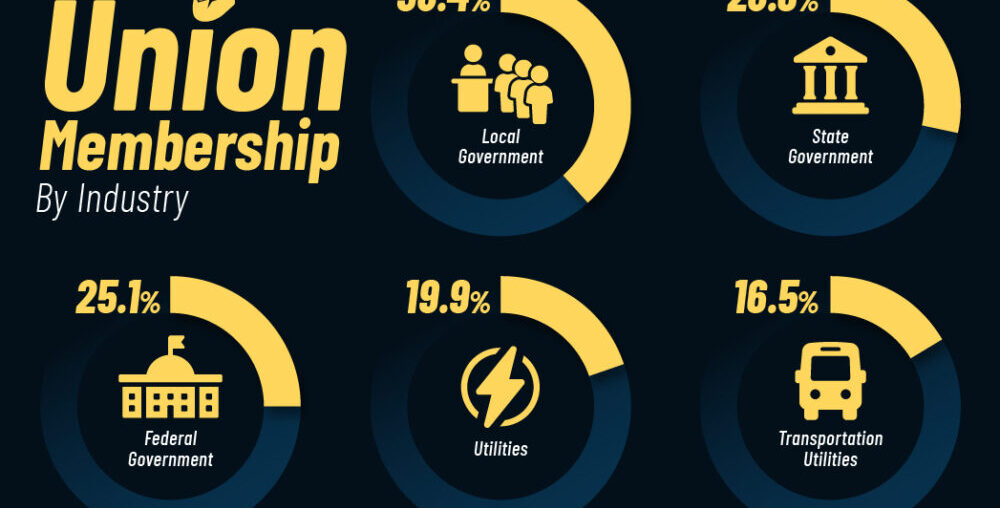Ranked: Union Membership by Industry in America
This was originally posted on our Voronoi app. Download the app for free on iOS or Android and discover incredible data-driven charts from a variety of trusted sources.
Today, union membership stands at historic lows of 10%, a stark decline from the 33.5% peak seen in 1954.
Despite a surge in unionizing efforts last year, from Starbucks and Amazon to Trader Joes and Uber, national membership rates fell for the second year in a row. This was due to the rise in non-union jobs, which largely offset the 191,000 new private sector unionized jobs.
This graphic shows the industries with the highest union membership rates in America, based on data from the U.S. Bureau of Labor Statistics.
The Top 10 Most Unionized Industries
As we can see in the table below, roughly a third of public sector jobs are unionized, led by the local government sector by a wide margin:
| Industry | Share of Union Members 2023 | Total |
|---|---|---|
| Local government | 38.4% | 3,856,000 |
| State government | 28.6% | 2,122,000 |
| Federal government | 25.1% | 1,032,000 |
| Utilities | 19.9% | 224000 |
| Transportation and utilities | 16.5% | 1,256,000 |
| Transportation and warehousing | 15.9% | 1,031,000 |
| Educational services | 12.9% | 666,000 |
| Motion pictures and sound recording industries | 12.1% | 47,000 |
| Construction | 10.7% | 954,000 |
| Broadcasting (except internet) | 9.7% | 26,000 |
| Total wage and salary workers | 10.0% | 14,424,000 |
When it comes to the private sector, utilities and transportation have the highest union membership rates, both providing essential services in highly-regulated industries.
For instance, the Utility Workers Union of America represents 45,000 members across the country, including employees at major firms such as Exelon, Duke Energy, and Southern Company. While 19.9% of utilities workers are unionized, it has fallen from 28.3% since 2010.
In the transportation and warehousing industry, over one million workers are unionized, at 15.9% of the workforce. However, it too has seen unionization declines, falling from over a quarter of workers in 2000.
As one of the largest unions in the country, the International Brotherhood of Teamsters has 1.3 million members across the U.S. and Canada, and is one of the primary unions for the transportation sector. Often, union members receive regular wage increases, pension plans, job security, and wages that exceed industry standards.
We can see that unionization rates in the film industry also falls above the national average, at 12.1%. Last year, the historic Writers Guild of Americas strike led to key pay negotiations, minimum staffing requirements, and new guidelines on the use of artificial intelligence as technological advancement reshapes the entertainment industry.
Overall, 14.4 million workers in America are unionized, with the country ranking 27th across 31 OECD countries by union density based on the most recent figures. By contrast, five countries have over 50% of workers that are unionized, including Iceland, Denmark, and Sweden.
Learn More on the Voronoi App 
To learn more about this topic from a geographic perspective, check out this graphic on union membership by state.

